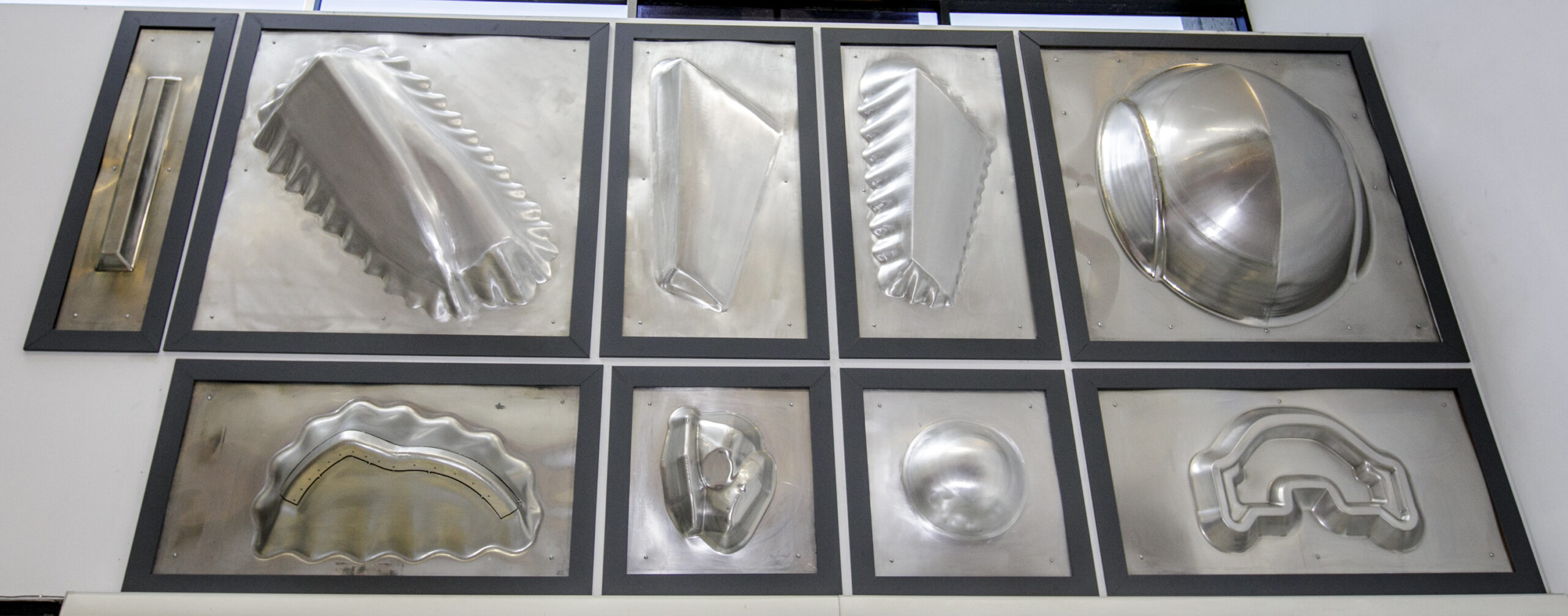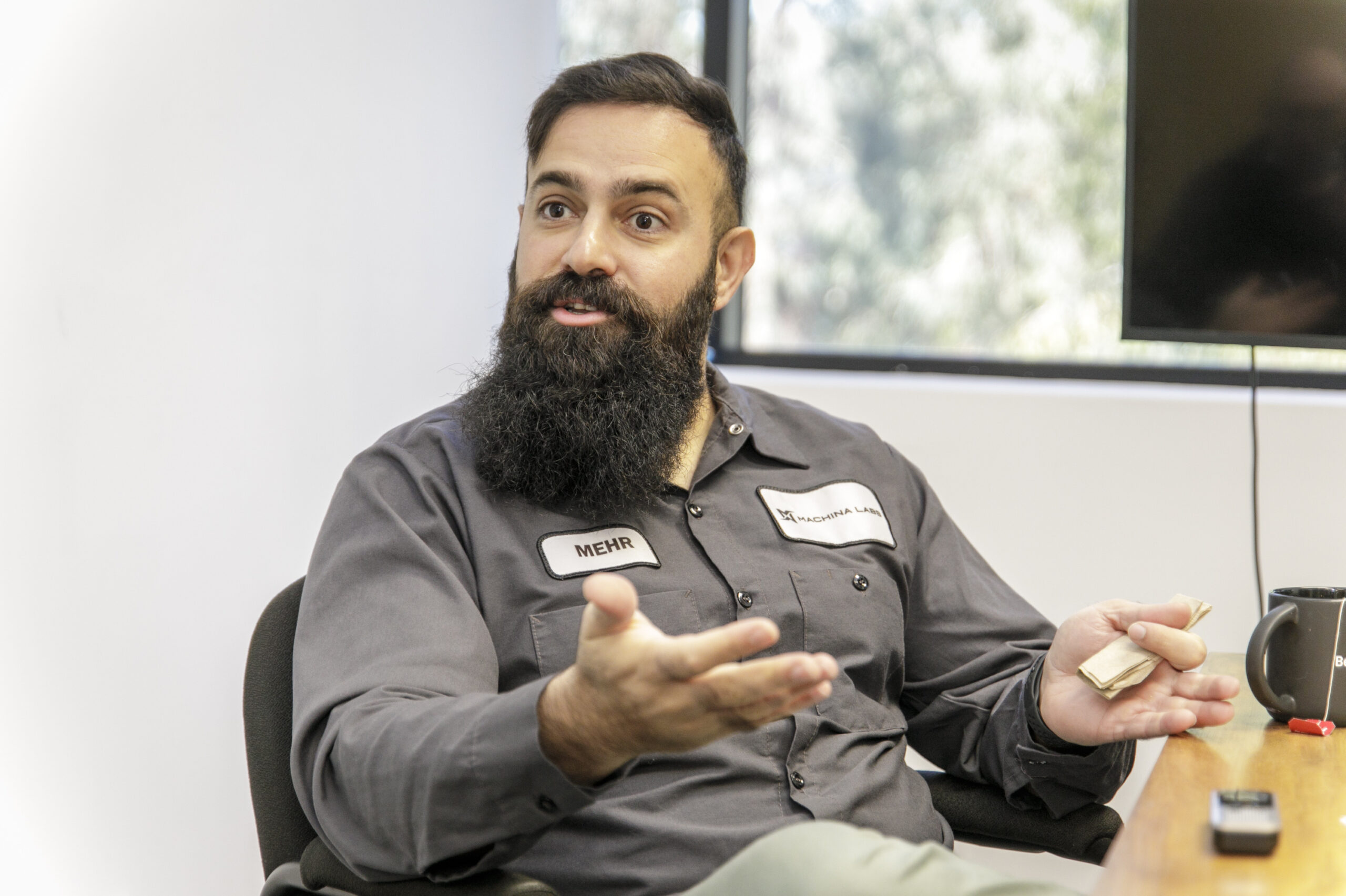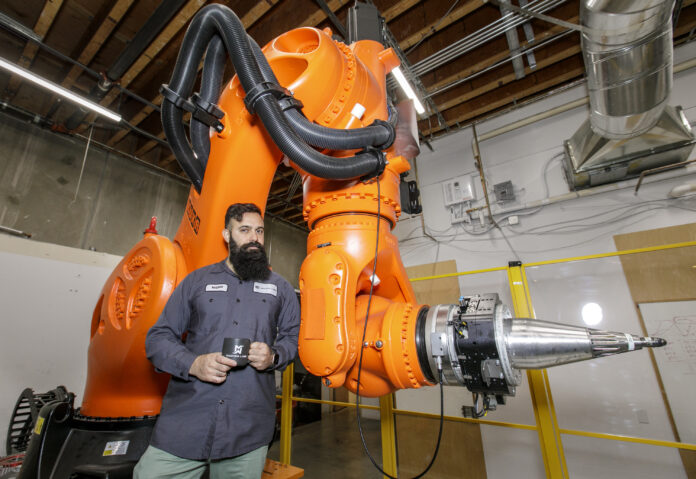The underlying mission of Machina Labs is simple: replicate what craftsmen or blacksmiths do, but do it with robots.
The Chatsworth-based company does this not by using dies or a lot of traditional tooling to shape the metal it uses to make parts for airplanes, autos and other industrial applications.
Edward Mehr, a co-founder and chief executive of Machina Labs, said a craftsman could be flexible and make many parts without relying on an abundance of tooling – the components and machinery needed to manufacture an object. One day he could use a hammer to make a sword, and the next day pick up that same hammer to knock out a piece of armor.
“That’s a paradigm we are applying here, but we are using robotics,” Mehr said.
Machina Labs employs industrial robots made by the Augsburg, Germany-based Kuka AG to scan, trim, drill and provide finishing to the metal it processes. With their seven-axis arms, the robots can autonomously pick up and manipulate cutting tools to remove material, drill holes and trim metal. Seven axes of motion allow for maximum articulation to trim or cut difficult features at the optimal angle.
To form sheet metal, the company uses its robots similar to how a potter makes a clay bowl using her fingers to pinch and form the bowl as it spins on a rotating wheel. At Machina Labs, two robots approach sheet metal from opposite sides and pinch and form the flat sheet into shape.
This differs from the standard industrial method of making two molds, or dies, and then putting the piece of metal between them and stamping out the formed piece on a press, Mehr said.
“The molds are expensive and take a long time to build, and that’s what makes them inflexible,” he added.
The Kuka robots run primarily at night and are very quiet. Because of the physical pressure they use to shape the sheet metal, there are no shavings left behind, which helps reduce waste material.
Machina’s main competition is the existing way of doing things; namely forming metal using dies and molds. There’s no one else that uses robots to shape metal, he continued.
“There are companies that use robots as part of their metal forming process, but only to move the metal from one place to another, not to do the actual shaping,” Mehr added.
Because Machina doesn’t need to create a mold before forming a metal item, the process is fast. Imagine being a baker and wanting to make a blueberry muffin, but first you had to design and build a muffin tin. That’s been the reality of metal forming for centuries, Mehr said.
“With Machina, it can make financial sense to make one item or thousands of items. You don’t need massive scale in order to justify building the mold first,” he said.
Beginnings

Mehr came out of the aerospace industry to start Machina Labs with his business partner, Babak Raeisinia, who is head of applications and partnerships, in 2019. Before forming the company, Mehr worked at Santa Monica-based on-demand scooter company Bird, and prior to that was a program manager at Relativity Space Inc., a Long Beach-based company that makes 3D-printed rockets and engines.
Machina Labs was self-funded until Mehr and Raeisinia began to reach out to venture capitalists they had known from previous jobs. Embark Ventures in Santa Monica and Congruent Ventures in San Francisco were among the first.
Since then, other investors have come on board, including Lockheed Martin Ventures and Yamaha Motor Ventures, the strategic business and development arm of Japan’s Yamaha Motor Co. Ltd. An undisclosed amount from the latter investor will go toward expanding the capabilities of the robots.
“We have these robotic craftsmen that can form sheet metal, that can do trimming, but what other options can we add to our system? Can we do hemming, can we do surface finishing, what kinds of operations can we add,” Mehr said. “Most of our investment money goes toward expanding those operations.”
Anish Patel, managing director at Yamaha Motor Ventures, said that many of the industries the company was involved with – maritime, land mobility, food and agriculture and more – require high levels of quality and precision at customized product volumes.
“For this reason, among others, our investment in Machina Labs is an ideal fit,” Patel said in a statement. “Their ability to rapidly iterate, improve and manufacture metallurgic products increases our speed of innovation. With an addressable market in the billions, we’re excited to play a role in Machina’s success.”
Customer base

The U.S. Air Force is the company’s largest client. It also is working with the Navy. On the commercial side its client, Atlanta-based Hermeus Corp. is using Machina Labs steel on a hypersonic plane. Lockheed Martin Corp. and Yamaha are also customers of the company. Mehr said Yamaha is interesting because it is not focused on aerospace products.
“We are excited to be able to show the applicability outside of aerospace and defense,” Mehr said.
Hermeus, which has operations in the Los Angeles area and is building its first hypersonic aircraft from scratch, represents the first time that Machina is building parts at the scale the customer is using them, Mehr continued.
“We are iterating on those designs on a weekly basis,” he said. “All of these components need to be built, 80 different parts need to be built, but each part is made significantly faster.”
Hermeus hopes to have a plane ready to test next year. Using traditional industrial methods, it would generally take a 10-year design life cycle to get to that point, Mehr said.
“Two years is a significant improvement over how it is traditionally done,” he added.
The parts being made for Hermeus are titanium, which is one of the few materials able to withstand hypersonic speeds, Mehr said.
Working with the material at room temperature was not possible until Machina was able to develop a process to do it.
“Because we locally and gradually form the sheets we get more formability out of it,” Mehr said.
Machina Labs has made parts for rockets, airplanes, boats, automobiles and a myriad of other items. It can make one item or it can make a 1,000 items and the overall economics are similar, he continued.
“I’m frankly not sure how to compare our pricing to old-fashioned sheet metal manufacturers, but we can produce in days or weeks what traditionally used to take months or years,” Mehr said. “Because we accelerate time to market so drastically, it would be like comparing Google to the Yellow Pages.”
